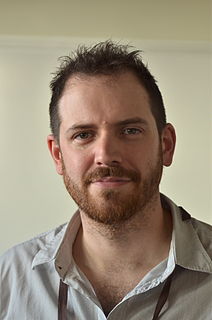A Quote by Ali Smith
The rhythmical unit of the syllable is at the back of all of it - the word, the phrase, the sentence, the syntax, the paragraph, and the way the heart moves when you read it.
Related Quotes
Certain individual words do possess more pitch, more radiance, more shazam! than others, but it's the way words are juxtaposed with other words in a phrase or sentence that can create magic. Perhaps literally. The word "grammar," like its sister word "glamour," is actually derived from an old Scottish word that meant "sorcery." When we were made to diagram sentences in high school, we were unwittingly being instructed in syntax sorcery, in wizardry. We were all enrolled at Hogwarts. Who knew?
To understand oneself requires patience, tolerant awareness; the self is a book of many volumes which you cannot read in a day, but when once you begin to read, you must read every word, every sentence, every paragraph for in them are the intimations of the whole. The beginning of it is the ending of it. If you know how to read, supreme wisdom is to be found.
What is easy to read has been difficult to write. The labour of writing and rewriting, correcting and recorrecting, is the due exacted by every good book from its author, even if he knows from the beginning exactly what he wants to say. A limpid style is invariably the result of hard labour, and the easily flowing connection of sentence with sentence and paragraph with paragraph has always been won by the sweat of the brow.
When I started graduate school we did this publishing class where we learned about submitting and read interviews with editors from different magazines. A lot of them said they got so many submissions that unless the first page stuck out or the first paragraph or even the first sentence they'll probably send it back. So part of my idea was that if I have a really good first sentence maybe they'll read on a bit further. At least half, maybe more of the stories in Knockemstiff started with the first sentence; I got it down then went from there.
Before the scene, before the paragraph, even before the sentence, comes the word. Individual words and phrases are the building blocks of fiction, the genes that generate everything else. Use the right words, and your fiction can blossom. The French have a phrase for it - le mot juste - the exact right word in the exact right position.
Personally I think that grammar is a way to attain Beauty. When you speak, or read, or write, you can tell if you've spoken or read or written a fine sentence. You can recognise a well-tuned phrase or an elegant style. But when you are applying the rules of grammar skilfully, you ascend to another level of the beauty of language. When you use grammar you peel back the layers, to see how it is all put together, to see it quite naked, in a way.
My favorite song he ever wrote was 'Cold Cold Heart.' If you think about it, the lyric to 'Cold Cold Heart,' see how many two syllable words are in that song. Very, very few. ... Verses and the choruses have very few two syllable words. 'I tried so hard my dear to show that you're my everything.' One three-syllable word.
I just wanted to speak to you about something from the Internal Revenue Code. It is the last sentence of section 509A of the code and it reads: 'For purposes of paragraph 3, an organization described in paragraph 2 shall be deemed to include an organization described in section 501C-4, 5, or 6, which would be described in paragraph 2 if it were an organization described in section 501C-3.' And that's just one sentence out of those fifty-seven feet of books.




































